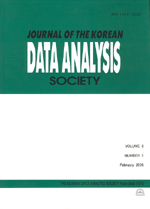한글 글자 교환 효과의 부재에 대한 사건관련 뇌파 증거
The Event Related Potential Evidence for the Absence of the Letter Transposition Effects for Korean
- 한국자료분석학회
- Journal of The Korean Data Analysis Society (JKDAS)
- Vol.17 No.3
-
2015.061531 - 1543 (13 pages)
- 21

글자 교환 효과는 단어내의 글자를 교환하여 만든 비단어가 단어내의 글자가 아닌 다른 글자로 대체하여 만든 비단어보다 더 단어로 착각되는 경우가 많은 현상으로 영어권 연구에서는 다양한 방법으로 그 효과가 입증되었다. 하지만 최근의 한글 연구에서는 글자 교환 효과가 나타나지 않는다는 증거들이 나타나서 한글의 경우는 영어권의 경우와 다르게 처리됨을 시사하고 있다. 따라서 본 연구에서는 단어재인의 초기 단계를 살펴보는데 적합하다고 알려진 사건관련 뇌파 측정을 이용하여 보다 민감한 측정치에서는 한글의 경우에도 글자 교환 효과가 나타나는지를 검증하고자 하였다. 이를 위하여 20명의 실험 참가자들의 글자 교환 조건의 뇌파 파형과 통제 조건의 뇌파파형을 비교하였다. 그 결과 두 조건간의 뇌파 파형 간에는 차이가 없는 것으로 나타났다. 이와 같은 결과는 다른 연구방법과 자극을 사용하여도 한글의 경우에는 글자 교환 효과가 나타나지 않는다는 것을 의미하며 기존의 반응시간 측정 결과와 함께 한글의 글자 교환 효과 부재에 대한 수렴적 증거를 제공하는 것이다. 한글의 초성, 중성, 종성의 위치 특정성과 모음이 자음과 형태적으로 구분되는 특성이 글자 교환에 따른 혼동을 방지하는 것으로 추론된다.
This letter transposition effect, non-words made by replacing letters in the same word bring more confusion than other non-words, is a solid phenomenon for English orthography. However, several recent Korean studies showed that transposing letters in a word does not cause confusions in behavioral performance. Therefore, the current study was conducted to investigate on whether the letter transposition effect is also absent in the event related potential (ERP) measurement which is known to be more sensitive measurement for detecting early stages of the visual word recognition processes. In this study, 20 participants’ ERPs of letter transposed non-words were compared with ERPs of control non-words. The results showed that the letter transposed non-words and control non-words did not bring any difference in the patterns of ERP. This ERP evidence consolidates the hypothesis that Korean letters are processed location specific, which is quite different from other alphabet orthographies.
1. 서론
2. 연구 방법
3. 결과
4. 논의 및 결론
References
(0)
(0)